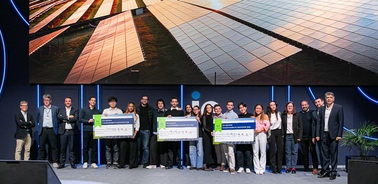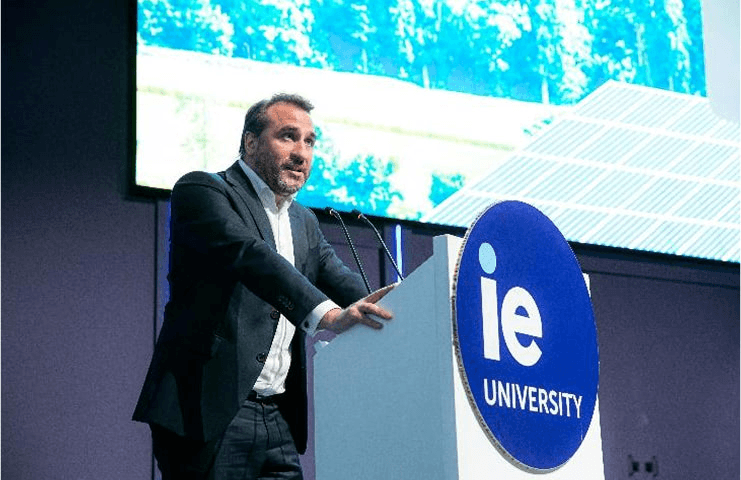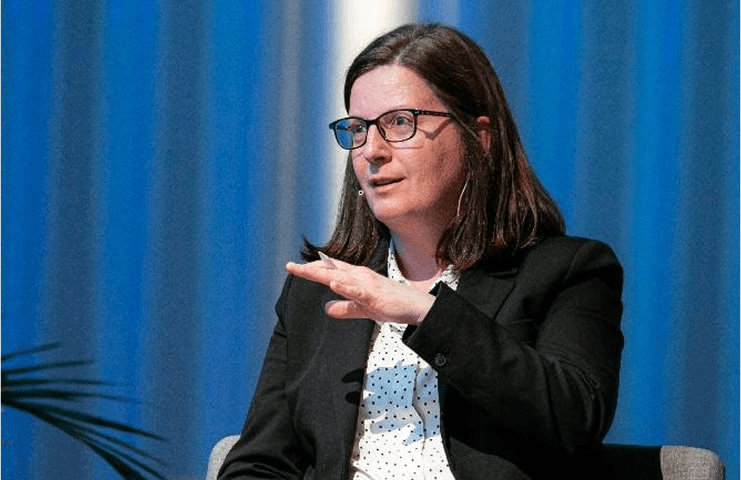Data-Powered Innovation Marks IE Sustainable Datathon

“The Residuals” step up to the Repsol challenge with first place at IE’s Sixth Sustainability Datathon.
Now in its sixth edition, the IE Sustainability Datathon has become a flagship event for lovers of data-science. Organized by the IE School of Science & Technology, this year’s edition brought together top students, industry leaders, and expert mentors to tackle a timely and complex challenge: optimizing the energy management of an industrial facility, set by global energy company Repsol.
This year’s Datathon was powered by Repsol and Infosys, with Infosys joining as ‘Idea Partner’. Juan José Casado, Rubén Muñoz Pedrero, Víctor Vaquero Soto from Repsol and Kisha Gupta, Guruprakash Sastry from Infosys provided students with expert guidance and inspiration throughout the competition.
Held at the IE Tower, the event featured technical workshops, mentorship sessions, and a closing ceremony with representatives from both partners in attendance. Five finalist teams pitched their solutions live and the winners were selected for their technical strength, creativity, and business insight:
- The Residuals – First Place
- Neural Navigators – Second Place
- Ctr+Alt+Defeat – Third Place
In parallel, the second edition of the IE High School Sustainability Datathon challenged students from international schools across the globe with an adapted competition. This year’s top honors went to Smarty Pants from the Southbank International School in London, who took first place, followed by Malinkte from Azbuki Elementary and Lower Secondary School in Bulgaria in second, and Alpha Analysts from Carlucci American International School of Lisbon who earned third place.
We spoke to some of the judges to find out what stood out particularly for them this year.
Juan José Casado, Chief Digital Officer at Repsol and one of the original architects of the Datathon challenge, underscored the significance of the event against the backdrop of two global transformations: the energy transition and the rise of AI.
"We’re facing the greatest challenge in human history—how to transition to sustainable energy while embracing the most transformative technology ever invented: artificial intelligence."
That’s why Repsol partnered with IE University for this year’s Sustainability Datathon, bringing a real case to the table and asking students to tackle it head-on. "What the students did today wasn’t academic," he said. "It was professional-grade work. They used real data, applied real methodologies, and delivered real results. That’s powerful."
Repsol has been at the forefront of AI in the energy sector, with nearly 600 AI use cases deployed since the launch of its digital program in 2018. Most of those initiatives support the company’s decarbonization goals, making AI not just a productivity tool, but a climate strategy. "AI can invent the energy of the future—cleaner, more reliable, and crucially, more affordable. But it takes people to make that happen."
Casado is passionate about bringing young minds into the energy sector. He wants them to see the opportunity not just as a job, but a meaning. "Find something you’re passionate about, and that you can do in a responsible and sustainable manner," he advised students. "Because when you care deeply about the problem, the work becomes meaningful. And that’s when you truly innovate."
Mayte Ballestar, Head of Analytical Consultants at Google and Researcher at IE Sci-Tech, praised this year's finalists for their exceptional ability to move beyond model-building and deliver business-ready solutions.
"This year’s challenge was especially tough—it was a live case from industry. Not easy if you’re unfamiliar with the sector," Ballestar explained. "But that’s what made the students’ solutions so impressive."
As one of the judges, Ballestar observed something many early-career data scientists miss: the ability to connect models to meaningful business outcomes.
"It’s easy to get lost in the technical beauty of a model," she said, "but what matters most is solving the actual business problem. These students did that—and more. Some teams even estimated economic benefits on top of the social impact we asked for. That’s exceptional."
Having judged five editions of the competition, Ballestar was struck by the participants’ maturity and strategic thinking. "They’re not just technically strong,” she said, "they're ready for the real world. Events like this give students visibility, practical experience, and make them highly competitive in the job market."
Her advice to the winners? "Polish your technical skills, but always stay close to the business. Understand the stakeholder. Know the context. That’s how you build solutions that last. We use technology to solve business problems. Never forget that."

